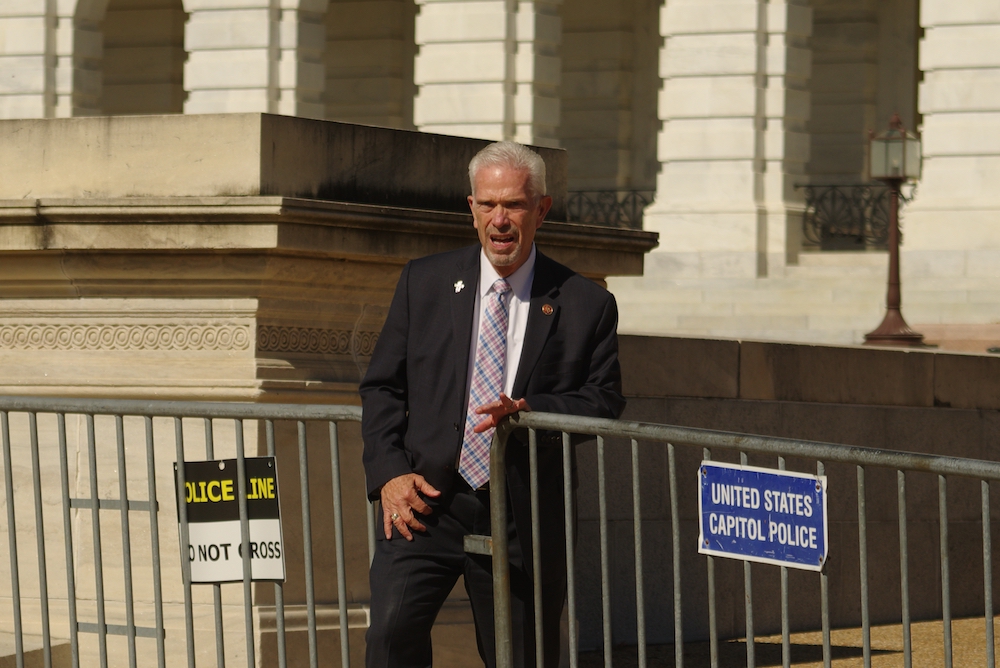Politics
JUST IN: Longtime GOP Congressman Resigns

Bill Johnson (R-OH) has officially submitted his letter of resignation, set to take effect on January 21. The move comes as he prepares to embark on a new journey as the president of Youngstown State University (YSU), starting the day after his resignation.
The YSU Board of Trustees, led by Chairman Michael Peterson, expressed their enthusiasm on Tuesday about Johnson starting his tenure earlier than initially planned.
Johnson’s appointment as YSU president was not without controversy. The decision, made by the YSU board of trustees with an 8-1 vote, faced criticism from faculty, students, alumni, and donors.
“With his contract indicating he would start prior to March 15, we are excited to have him on campus earlier than anticipated,” Peterson wrote. “Bill will continue to visit campus as often as his schedule allows to continue meeting with students, faculty and staff. Bill brings a commitment to advancing our institution’s mission and we eagerly anticipate the contributions he and his wife LeeAnn will make to our community.”
Concerns were raised about the confidential nature of the search process and Johnson’s political background, coupled with experience in higher education. This led to the YSU Academic Senate issuing “no-confidence” resolutions against both the trustees and Johnson.
Johnson, known for his close alignment with former President Donald Trump, has been a subject of criticism for his political stances. This includes his opposition to abortion, restrictions on gun rights, and his vote against certifying the 2020 election results from Arizona and Pennsylvania.
Youngstown-born actor Ed O’Neill, who has an honorary doctorate from YSU, called the choice “disgraceful” and considered returning his degree. Major donor Bruce Zoldan, owner of Phantom Fireworks, expressed his intent to stop donating if Johnson remains as president and requested his name not be used on a new student center building.
Critics, including Zoldan, have taken issue with the university’s “secretive” hiring process, where the names of other candidates were not released. Zoldan also questioned Johnson’s qualifications for leading an institution of diversified backgrounds, given his lack of experience in such a role.
The YSU Foundation echoed these concerns, stating a preference for a more inclusive process that represented the university’s broader community. Ed Muransky, Foundation Chair, reportedly stepped down due to dissatisfaction with the hiring process, although the YSU Foundation did not confirm this claim.
The YSU Board of Trustees defended their hiring process, citing the need to protect the anonymity of candidates. In response to the controversy, Johnson stated his intent to leave politics behind and his commitment to ensuring a diverse range of voices and perspectives at the university. He also addressed concerns about liberal bias in higher education.
And Bill Johnson is out.
He says he will "continue serving in the House for several more months." He says he won't run again, but doesn't say whether he'll leave during the term https://t.co/aBgMGQ2vWj
— Jake Sherman (@JakeSherman) November 21, 2023
In November, Johnson announced that he would not be seeking an eighth term in the U.S. House of Representatives. Since his election, Johnson has been a prominent figure in the GOP. His career in Congress has been marked by contributions to policy areas such as energy, tax reform, and public safety. He has been a proponent of traditional energy sources like coal and natural gas.
Johnson wrote, “This is not a goodbye, however. I will continue serving in the House for several more months, and you will see no let up. My offices are open and my staff remains ready to serve you. There is still much left on my agenda to do before I depart Congress.”
“It’s business as usual,” he finished.
Within the Republican Party, Johnson has been seen as a reliable conservative voice. He has aligned with the party’s mainstream positions on most issues and has been a part of the party’s efforts to shape national policy in various areas, particularly energy and veterans’ affairs.

